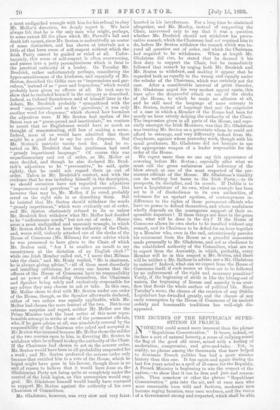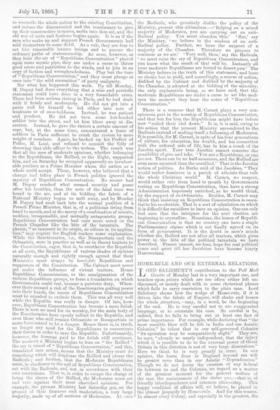THE INCUBUS OF THE REPUBLICAN SUPER- STITION IN FRANCE. to
reconcile the whole nation to the existing Constitution, and induce the discontented and the reactionary to give up their constructive treasons, melts into thin air, and the old war of sects and factions begins again. It is as if the men who make up and support French Governments had sold themselves to some devil. As a rule, they are free to act like reasonable human beings and to pursue the ordinary paths of statesmanship. As soon, however, as they hear the air of " Republican Concentration " played upon some mystic pipe, they are under a curse to throw good sense and patriotism to the winds, and to join in an orgy of faction and wrongheadedness. Play but the tune of "Republican Concentration," and they must plunge at once into " the wild enormities" of party malignity. See what has happened this week. Up till Monday, M. Dupuy had done everything that a wise and patriotic statesman could have done in a very formidable crisis. There had been serious rioting in Paris, and he had dealt with it firmly and moderately. He did not get into a panic and let himself be led either into acts of weakness or of over-boldness. Instead, he was patient and prudent. He did not turn some hot-headed soldier into the street, and let him blaze away at dis cretion. Instead, he gave the rioters a certain amount of rope, but, at the same time, concentrated a force of soldiers in Paris sufficient to crush the rioters by mere weight of numbers. Again, he backed up his Prefect of Police, M. Loz6, and refused to commit the folly of throwing that able officer to the wolves. The result was that all the men of moderate opinions, whether belonging to the Republicans, the Rallied, or the Right, supported him, and on Saturday he occupied apparently an invulner- able position as a Prime Minister whom the nation as a whole could accept. Those, however, who believed that a change had taken place in French politics ignored the mystery of Republican Concentration. No sooner had M. Dupuy reached what seemed security and peace after his troubles, than the note of the fatal tune was heard in the air, and at its bidding the fabric of a National Ministry began to melt away, and by Monday M. Dupuy had sunk back into the normal position of a French Prime Minister, that is, of a politician living from hand to mouth, and at the mercy of a combination of minute, reckless, irresponsible, and mutually antagonistic groups. Republican Concentration had once more acted on the French Chamber like the bite of the tarantula. The phrase, " so innocent in its origin, so odious in its applica- tion," may require for English readers some explanation. While the Reactionaries, i.e., the Bonapartists and the Orleanists, were in practice as well as in theory traitors to the Constitution, eager, that is, to overthrow the Republic at all costs, the Republicans of various shades of opinion naturally enough and rightly enough agreed that their Ministries must always be bona fideRepublican and supporters of the Constitution. The Cabinet must never get under the influence of virtual traitors. Hence Republican Concentration, or the amalgamation of the various Republican groups, to form a foundation on which Governments could rest, became a patriotic duty. When- ever there seemed a risk of the Reactionaries getting power into their hands, the tocsin of Republican Concentration must be sounded to exclude them. This was all very well while the Republic was really in danger. Of late, how- ever, Republican Concentration has become a mere fetish. There is now no need for its worship, for the main body of the Reactionaries have openly rallied to the Republic, and even those who still remain Orleanists or Bonapartists in name have ceased to be a danger. Hence there is, in truth, no longer any need for the Republicans to concentrate their forces in order to save the Republic. Unfortunately, however, the homage paid to the fetish still continues. The moment a Ministry begins to lean on " the Rallied " the cry is raised of " Republican Concentration," and this, translated into action, means that the Ministry must do something which will displease the Rallied and please the Radicals ;- and further, that the Moderate Republicans must, in obedience to the call of Republican Concentration, act with the Radicals, and not in accordance with their own convictions. That is, in order to escape the charge of being the slaves of the Rallied, the Moderates must act and vote against their most cherished opinions. For example, the present Ministry last Saturday got, on the ground of their firmness and moderation, a very large majority, made up of all sections of Moderates. At once the Radicals, who genuinely dislike the policy of the Ministry, present this ultimatum :—'Relying on a mixed majority of Moderates, you are carrying out an anti- Radical policy. You must abandon this.' But,' say the Ministry, we believe in the wisdom of an anti- Radical policy. Further,• we have the support of a majority of the Chamber. Therefore we propose to continue as we are.' Very well, then,' say the Radicals, ' we must raise the cry of Republican Concentration, and you know what the result of that will be. Instantly all your moderate Republicans are bound to desert you.' The Ministry believe in the truth of this statement, and have no choice but to yield, and accordingly, a course of action, disliked by the Cabinet and disliked by the majority of the Chamber, is adopted at the bidding of the minority, the only explanation being, as we have said, that the moderate Republicans are under a curse to act like mad- men the moment they hear the notes of "Republican Concentration."
There is a rumour that M. Carnot plays a very con- spicuous part in the worship of Republican Concentration, and that but for him the Republicans might have before now "rolled their idol down." It is, it is said, owing to his action that the present Ministry surrendered to the Radicals instead of making itself a following of Moderates. It is possible, for M. Carnot, in spite of his four generations of culture, his education, his wealth, and his connection with the ordered side of life, has in him a touch of the Jacobin spirit. Your true Jacobin cannot conceive the possibility of give and take. You are a Republican, or you are not. There can be no half-measures, and the Rallied are even more accursed than the unrallied.' That is the Jacobin notion of politics. As Burke said of the Jacobins, " They would rather domineer in a parish of atheists than rule the whole Christian world." M. Carnot, we suspect, would rather rule from hand to mouth by Governments resting on Republican Concentration, than have a strong Administration hopelessly smirched, as he would think, by the support of ex-Orleanists. Besides, M. Carnot may think that insisting on Republican Concentration is essen- tial to his re-election. That is a sort of calculation on which it is difficult for outsiders to have an opinion. One can only feel sure that the intrigues for the next election are beginning to crystallise. Meantime, the lesson of Republi- can Concentration is that no country can have a staple Parliamentary regime which is not finally agreed on its form of government. It is the. doubt in men's minds whether the Rallied are not after all traitors, which gives power to the bite of the political tarantula we have described. France cannot, we fear, hope for real political peace and quiet till her Jacobites have become hearty Han overians.



































 Previous page
Previous page